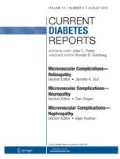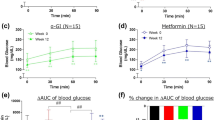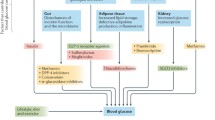Abstract
Although most commonly used drugs such as biguanides, sulfonylureas, and more recently, thiazolidinediones, are effective in controlling fasting hyperglycemia, a high percentage of patients have sustained elevated hemoglobin A1c because of persistent elevation of postprandial plasma glucose (PPPG). α-Glucosidase inhibitors (AGIs) specifically target PPPG. AGIs have been shown in several randomized controlled trials to be effective in controlling blood glucose, whether they are used as monotherapy or in combination with other antidiabetic medications. Among the AGIs, acarbose has also been shown to decrease the risk of progressing to diabetes in subjects with impaired glucose tolerance (IGT). Studies have also suggested that acarbose could decrease the risk of cardiovascular disease, both in IGT and in diabetes. Furthermore, AGIs are very safe and are nontoxic drugs. Their only side effects are gastrointestinal, such as flatulence and diarrhea; however, these can be minimized by the “start low, go slow” approach. AGIs should be considered whenever postprandial hyperglycemia is the dominant metabolic abnormality.
Similar content being viewed by others
References and Recommended Reading
Effect of intensive blood-glucose control with metformin on complications in overweight patients with type 2 diabetes (UKPDS 34). UK Prospective Diabetes Study Group [no authors listed]. Lancet 1998, 352:854–865.
Intensive blood-glucose control with sulphonylureas or insulin compared with conventional treatment and risk of complications in patients with type 2 diabetes (UKPDS 33). UK Prospective Diabetes Study Group [no authors lsited]. Lancet 1998, 352:837–853.
The effect of intensive treatment of diabetes on the development and progression of long-term complications in insulin-dependent diabetes mellitus. DCCT Research Group [no authors listed]. N Engl J Med 1993, 329:977–986.
Nathan DM, Cleary PA, Backlund JY, et al.: Intensive diabetes treatment and cardiovascular disease in patients with type 1 diabetes. N Engl J Med 2005, 353:2643–2653.
Woerle HJ, Neumann C, Zschau S, et al.: Impact of fasting and postprandial glycemia on overall glycemic control in type 2 diabetes Importance of postprandial glycemia to achieve target HbA1c levels. Diabetes Res Clin Pract 2007, 77:280–285.
Bischoff H: Pharmacology of alpha-glucosidase inhibitors. In Drugs in Development, Alpha-Glucosidase Inhibition: Potential Use in Diabetes. Edited by Vasselli JR, Maggio CA, Scriabine A. Branford, Connecticut: Neva Press; 1993:3–13.
Seifarth C, Bergmann J, Holst JJ, et al.: Prolonged and enhanced secretion of glucagon-like peptide 1 (7–36 amide) after oral sucrose due to alpha-glucosidase inhibition (acarbose) in type 2 diabetic patients. Diabetic Med 1998, 15:485–491.
van de Laar FA, Lucassen PL, Akkermans RP, et al.: Alpha-glucosidase inhibitors for patients with type 2 diabetes: results from a Cochrane systematic review and meta-analysis. Diabetes Care 2005, 28:154–163.
Josse RG, Chiasson JL, Ryan EA, et al.: Acarbose in the treatment of elderly patients with type 2 diabetes. Diabetes Res Clin Pract 2003, 59:37–42.
Johnston PS, Lebovitz HE, Coniff RF, et al.: Advantages of alpha-glucosidase inhibition as monotherapy in elderly type 2 diabetic patients. J Clin Endocrinol Metab 1998, 83:1515–1522.
Hoffmann J, Spengler M: Efficacy of 24-week monotherapy with acarbose, glibenclamide, or placebo in NIDDM patients. The Essen Study. Diabetes Care 1994, 17:561–566.
Chiasson JL, Naditch L: The synergistic effect of miglitol plus metformin combination therapy in the treatment of type 2 diabetes. Diabetes Care 2001, 24:989–994.
Chiasson JL: Alpha-glucosidase inhibitors. In Excerpt from Clinical Diabetes Translating Research into Practice. Edited by Fonseca VA. Toronto: Elsevier Canada; 2007:321–330.
Lopez J, Aguilar C, Velasco ML, et al.: Acarbose versus bedtime NPH insulin in the treatment of secondary failures to sulfonylureas metformin therapy in NIDDM. Diabetes 1997, 46(suppl 1):94A 1997.
Chiasson JL, Josse RG, Hunt JA, et al.: The efficacy of acarbose in the treatment of patients with non-insulin-dependent diabetes mellitus. A multicenter controlled clinical trial. Ann Intern Med 1994, 121:928–935.
Standl E, Baumgartl HJ, Fuchtenbusch M, Stemplinger J: Effect of acarbose on additional insulin therapy in type 2 diabetic patients with late failure of sulphonylurea therapy. Diabetes Obes Metab 1999, 1:215–220.
Hara T, Nakamura J, Koh N, et al.: An importance of carbohydrate ingestion for the expression of the effect of alpha-glucosidase inhibitor in NIDDM. Diabetes Care 1996, 19:642–647.
Coniff RF, Shapiro JA, Seaton TB, et al.: A double-blind placebo-controlled trial evaluating the safety and efficacy of acarbose for the treatment of patients with insulin-requiring type II diabetes. Diabetes Care 1995, 18:928–932.
Güvener N, Gedik O: Effects of combination of insulin and acarbose compared with insulin and gliclazide in type 2 diabetic patients. Acta Diabetol 1999, 36:93–97.
Soonthornpun S, Rattarasarn C, Thamprasit A, Leetanaporn K: Effect of acarbose in treatment of type II diabetes mellitus: a double-blind, crossover, placebocontrolled trial. J Med Assoc Thai 1998, 81:195–200.
Edelstein SL, Knowler WC, Bain RP, et al.: Predictors of progression from impaired glucose tolerance to NIDDM: an analysis of six prospective studies. Diabetes 1997, 46:701–710.
Chiasson JL, Josse RG, Gomis R, et al.: Acarbose for prevention of type 2 diabetes mellitus: the STOP-NIDDM randomised trial. Lancet 2002, 359:2072–2077.
Report of the expert committee on the diagnosis and classification of diabetes mellitus [no authors listed]. Diabetes Care 1997, 20:1183–1197.
World Health Organization: Definition, Diagnosis and Classification of Diabetes Mellitus and Its Complications: Report of a WHO Consultation. Part I: Diagnosis and Classification of Diabetes Mellitus. Geneva: World Health Organization; 1999.
Yang W, Lixiang L, Jinwu Q, et al.: The preventive effect of acarbose and metformin on the progression to diabetes mellitus in the IGT population: a 3-year multicenter prospective study. Chin J Endocrinol Metab 2001, 17:131–136.
Knowler WC, Barrett-Connor E, Fowler SE, et al.: Reduction in the incidence of type 2 diabetes with lifestyle intervention or metformin. N Engl J Med 2002, 346:393–403.
Tuomilehto J, Lindstrom J, Eriksson JG, et al.: Prevention of type 2 diabetes mellitus by changes in lifestyle among subjects with impaired glucose tolerance. N Engl J Med 2001, 344:1343–1350.
Gerstein HC, Yusuf S, Bosch J, et al.: Effect of rosiglitazone on the frequency of diabetes in patients with impaired glucose tolerance or impaired fasting glucose: a randomised controlled trial. Lancet 2006, 368:1096–1105.
Qiao Q, Tuomilehto J, Borch-Johnsen K: Post-challenge hyperglycemia is associated with premature death and macrovascular complications. Diabetologia 2003, 46(suppl 1):M17–M21.
Monnier L, Lapinski H, Colette C: Contributions of fasting and postprandial plasma glucose increments to the overall diurnal hyperglycemia of type 2 diabetic patients: variations with increasing levels of HbA(1c). Diabetes Care 2003, 26:881–885.
Shiraiwa T, Kaneto H, Miyatsuka T, et al.: Postprandial hyperglycemia is a better predictor of the progression of diabetic retinopathy than HbA1c in Japanese type 2 diabetic patients. Diabetes Care 2005, 28:2806–2807.
Coutinho M, Gerstein HC, Wang Y, Yusuf S: The relationship between glucose and incident cardiovascular events. A metaregression analysis of published data from 20 studies of 95,783 individuals followed for 12.4 years. Diabetes Care 1999, 22:233–240.
Balkau B, Shipley M, Jarrett RJ, et al.: High blood glucose concentration is a risk factor for mortality in middle-aged nondiabetic men. 20-year follow-up in the Whitehall Study, the Paris Prospective Study, and the Helsinki Policemen Study. Diabetes Care 1998, 21:360–367.
Eschwege E, Richard JL, Thibult N, et al.: Coronary heart disease mortality in relation with diabetes, blood glucose and plasma insulin levels. The Paris Prospective Study, ten years later. Horm Metab Res Suppl 1985, 15:41–46.
Hu FB, Stampfer MJ, Haffner SM, et al.: Elevated risk of cardiovascular disease prior to clinical diagnosis of type 2 diabetes. Diabetes Care 2002, 25:1129–1134.
Bonora E: Postprandial peaks as a risk factor for cardiovascular disease: epidemiological perspectives. Int J Clin Pract Suppl 2002, 129:5–11.
Chiasson JL, Josse RG, Gomis R, et al.: Acarbose treatment and the risk of cardiovascular disease and hypertension in patients with impaired glucose tolerance. The STOP-NIDDM Trial. JAMA 2003, 290:486–494.
Hanefeld M, Chiasson JL, Koehler C, et al.: Acarbose slows progression of intima-media thickness of the carotid arteries in subjects with impaired glucose tolerance. Stroke 2004, 35:1073–1078.
Hanefeld M, Cagatay M, Petrowitsch T, et al.: Acarbose reduces the risk for myocardial infarction in type 2 diabetic patients: meta-analysis of seven long-term studies. Eur Heart J 2004, 25:10–16.
Inoue I, Shinoda Y, Nakano T, et al.: Acarbose ameliorates atherogenecity of low-density lipoprotein in patients with impaired glucose tolerance. Metabolism 2006, 55:946–952.
Ceriello A, Taboga C, Tonutti L, et al.: Post-meal coagulation activation in diabetes mellitus: the effect of acarbose. Diabetologia 1996, 39:469–473.
Wascher TC, Schmoelzer I, Wiegratz A, et al.: Reduction of postchallenge hyperglycaemia prevents acute endothelial dysfunction in subjects with impaired glucose tolerance. Eur J Clin Invest 2005, 35:551–557.
Gentile S, Turco S, Guarino G, et al.: Effect of treatment with acarbose and insulin in patients with non-insulin-dependent diabetes mellitus associated with non-alcoholic liver cirrhosis. Diabetes Obes Metab 2001, 3:33–40.
Author information
Authors and Affiliations
Corresponding author
Rights and permissions
About this article
Cite this article
Godbout, A., Chiasson, JL. Who should benefit from the use of alpha-glucosidase inhibitors?. Curr Diab Rep 7, 333–339 (2007). https://doi.org/10.1007/s11892-007-0055-x
Published:
Issue Date:
DOI: https://doi.org/10.1007/s11892-007-0055-x




